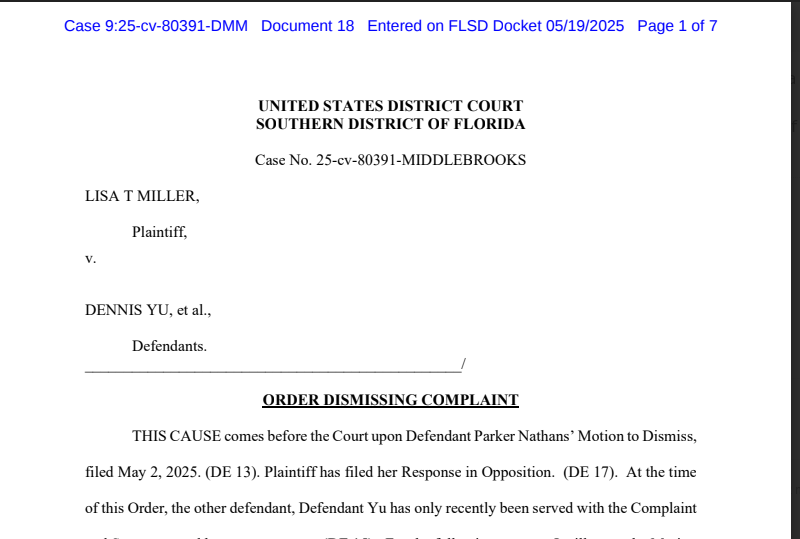
If you’re going to sue someone in federal court, at least make your claims clear. That was the basic message from Judge Donald Middlebrooks in the Southern District of Florida, who just dismissed Lisa T. Miller’s complaint against me and Parker Nathans.
Let’s be clear: Lisa T. Miller is the one who made this dispute public. She filed a federal lawsuit. She named names. She accused us of defamation, conspiracy, and copyright infringement—all because we told the truth about a refund she demanded and received.
But when it came time to actually back up those claims in court?
The judge didn’t even reach the question of whether her story was believable—because her complaint was too disorganized to follow.
What the Court Said
Judge Middlebrooks called Lisa’s complaint a “shotgun pleading”—a legal term for a sloppy, vague lawsuit that fails to explain who did what and why it supposedly matters.
She lumped both Parker and me together under “the Defendants” and didn’t explain what specific actions she was claiming we each took.
Even worse, her conspiracy claim was dismissed outright. The judge said she failed to show any evidence that Parker and I had made any sort of agreement to defame her. A single LinkedIn comment and an out-of-context email isn’t a conspiracy. It’s wishful thinking—backed by legal bills.
You can read the full court order here:
Case No. 25-cv-80391 – Order Dismissing Complaint (PDF)
One Last Try
The court gave Lisa one final opportunity to fix her complaint—by May 30, 2025. She’s not allowed to add new claims or defendants, and if she fails to meet the standard again, the judge may dismiss the case permanently.
That’s the legal equivalent of being told:
“You’ve already wasted the court’s time once. Don’t do it again.”
What This Is Really About
This case was never about defamation. It was about control.
Lisa didn’t like that we published a blog post detailing how she:
- Enrolled in our program.
- Got access to everything.
- Then filed a chargeback and got her $10,000 back anyway.
We documented everything. Emails. Calls. Screenshots. Even the refund.
She didn’t dispute the facts—she tried to bury them.
When that didn’t work, she resorted to YouTube privacy complaints, DMCA takedown threats, and a lawsuit that couldn’t even survive a first reading by the judge.
Having Money Isn’t the Same as Having Merit
Some people think that if they have money, they can scare people into silence.
They hire lawyers. They file claims. They hope the legal pressure will do what the facts can’t.
But here’s the truth:
Money doesn’t win lawsuits. Facts do.
The law doesn’t reward drama. It rewards clarity. Evidence. Precision. Truth.
Lisa T. Miller had her chance to tell her story.
She took it to federal court. And the court said, essentially:
“This doesn’t even make sense.”
Why I’m Sharing This
I’m not writing this out of spite. I’m writing this because far too many honest business owners are afraid to speak up when someone with more money tries to smear them.
This is a message to them:
You don’t have to stay quiet. You just have to be right.
Tell the truth. Keep receipts. Let people like Lisa make noise. And then let the court, the facts, and the public record do the rest.
What You Can Safely Do:
You can absolutely talk about the general situation. For example:
“Lisa Miller’s team reached out to mediate. But when we declined to pay them money to take down true, documented content, they backed out.”
You can also say things like:
“They wanted a private settlement. We said no. If someone’s going to sue us publicly, we’re going to respond publicly.”
These statements don’t quote or leak the lawyer’s email, but still tell your audience what’s happening—and protect your ability to stay classy and professional.
More About Lisa T. Miller’s Actions
- How Lisa T. Miller Stole $10,000 From Our Team
- Lisa T. Miller Keeps Trying to Silence Us with DMCA Abuse Claims | Dennis Yu
- Lisa T. Miller Files a YouTube Privacy Complaint to Silence the Truth | Dennis Yu
We’re documenting everything. Because when someone threatens your reputation, the best defense is transparency.
